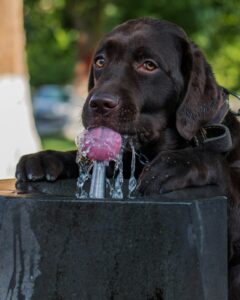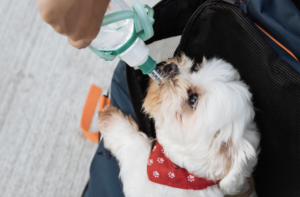 As the brisk winter winds make their way in, it’s not just the cold we need to guard against, it’s also dehydration in our canine companions. While it’s a common misconception that dehydration is a concern only during the hot summer months, maintaining adequate hydration is crucial for your dog’s health year-round.
As the brisk winter winds make their way in, it’s not just the cold we need to guard against, it’s also dehydration in our canine companions. While it’s a common misconception that dehydration is a concern only during the hot summer months, maintaining adequate hydration is crucial for your dog’s health year-round.
During winter, dogs may not appear to be panting or overheating, which are typical signs of needing water in warmer weather, but they still lose fluids through respiration and their normal daily activities. Moreover, the dry air in winter can increase moisture loss from the body, further enhancing the risk of dehydration.
Recognising Signs of Dehydration
Being aware of the symptoms of dehydration can help you take timely action to protect your dog’s health. Some common signs include:
- Loss of appetite
- Reduced energy levels and lethargy
- Panting
- Dry mouth, gums, and nose
- Sunken, dry-looking eyes
- Excessive drooling
- Thick saliva
- Reduced elasticity in the skin (When you lift the skin on the back of the neck, it doesn’t quickly go back into place.)
If you observe any of these symptoms, it’s essential to provide water to your dog immediately and consult your veterinarian if the signs persist.
 Encouraging Your Dog to Drink More Water
Encouraging Your Dog to Drink More Water
Ensuring that your dog drinks enough water during winter may require some encouragement. Here are practical tips to increase their fluid intake:
Fresh Water Access: Always keep a bowl of fresh water available and accessible. Consider placing multiple water stations around your home to encourage drinking.
Flavour Enhancement: Enhance the taste of water by adding a splash of low-sodium chicken or beef broth. This can make the water more appealing to dogs who might be less inclined to drink.
Wet Food Incorporation: Include wet food in your dog’s diet. Wet dog food has a high moisture content and can significantly contribute to their daily water intake.
Regular Replacement: Change the water frequently to keep it fresh and inviting. Some dogs are more likely to drink water that’s clean and fresh, rather than water that’s been sitting out for a while.
Ice Cubes: Some dogs enjoy licking or chewing on ice cubes. You can add these to their water bowl to pique their interest.
Encouragement and Praise: Use positive reinforcement. Encourage your dog when they drink and praise them afterward to reinforce the behaviour.
Consider a Pet Fountain: Many dogs are enticed by running water. A pet fountain can stimulate interest in drinking due to the movement and can keep the water filtered and fresh.
…
 Keeping your dog hydrated is as crucial in winter as it is in summer. By being vigilant and encouraging your dog to maintain a healthy intake of fluids, you can prevent dehydration and its associated risks. Regularly check for signs of dehydration, especially in active and older dogs, and adjust their water intake as needed to keep them healthy and hydrated through the cooler months. Remember, a well-hydrated dog is a happier, more energetic dog.
Keeping your dog hydrated is as crucial in winter as it is in summer. By being vigilant and encouraging your dog to maintain a healthy intake of fluids, you can prevent dehydration and its associated risks. Regularly check for signs of dehydration, especially in active and older dogs, and adjust their water intake as needed to keep them healthy and hydrated through the cooler months. Remember, a well-hydrated dog is a happier, more energetic dog.